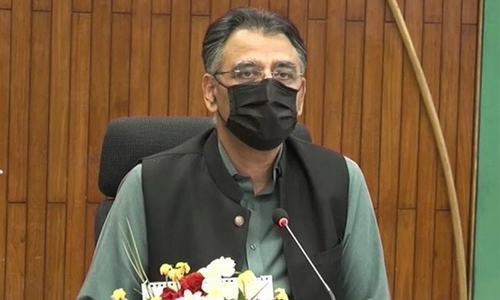• Guidelines issued to stay safe from Covid during Ramazan
• 594 more oxygen beds provided to healthcare facilities
ISLAMABAD: As over 4,700 more people have been infected with coronavirus, the National Command and Operation Centre (NCOC) has issued guidelines for Ramazan, banning entry of people older than 50 years and adolescents in mosques/imambargahs for Namaz and Taraweeh and advising the people to perform Aitikaf at home.
Moreover, Sehr and Iftar will not be arranged at mosques or imambargahs.
As many as 594 more oxygenated beds have been provided to dedicated Covid-19 healthcare facilities with special focus on Swat and Peshawar, the NCOC was told. Administration of single dose Cansino vaccine, which has arrived from China, will commence on Monday (tomorrow).
According to the NCOC data, as many as 4,723 new Covid-19 cases and 84 deaths were reported in a single day. While 393 ventilators were being used by Covid-19 patients across the country, over 50 per cent of the ventilators were in use in Multan, Lahore, Gujranwala and Islamabad. Over 70pc of oxygenated beds were in use in Gujranwala, Gujrat, Peshawar and Swat.
The number of active cases reached 58,500 as of April 3.
According to the guidelines for Ramazan issued by the NCOC after consultation with ulema, carpet or rugs will not be spread in mosques or imambargahs and prayers will be offered on bare floors. Clean chatais (mats) can be used if the floor is earthen. If people wish to bring their own prayer mats from home, they can do so. People have been advised to avoid gathering before and after prayers.
In mosques and imambargahs where there is a courtyard, prayers will be offered in the courtyard.
People older than 50 years, adolescents and those suffering from flu, cough, etc are advised not to come to mosques or imambargahs. Namaz/Taraweeh will be arranged within boundaries of mosques or imambargahs and praying on roads and footpaths will be avoided. The floors of mosques and imambargahs will be cleaned with Chlorine solution in water which should also be used to wipe chatais (mats) before prayers.
According to the guidelines, rows of praying individuals should be aligned in such a way that there is a distance of six feet between two individuals. People have been suggested to come to mosque or imambargahs after performing ablution at home and washing hands with soap for 20 seconds.
Wearing a mask will be obligatory for those coming to mosques or imambargahs and they should not shake hands or hug anyone.
Mosques and Imambargahs have been advised to constitute committees comprising responsible individuals to ensure adherence to precautionary measures. In case of violation of the guidelines, the government may revise the guidelines.
A meeting of the NCOC, chaired by Asad Umar through video link and co-chaired by NCOC National Coordinator Lt Gen Hamood Uz Zaman Khan, emphasised that Covid-19 vaccination centers must ensure to facilitate people above 65 years who already had been allowed walk-in at the vaccination facilities. The forum decided to enhance monitoring mechanism to check violation of preventive Standard Operating Procedures on Covid-19.
“Establishment of call centres at district level to pursue registered senior citizens for vaccination was also discussed to further enhance the efficacy of this reach-out drive.
Meanwhile, federal Minister for Planning and Development Asad Umar has questioned the United Kingdom’s decision to ban entry of travellers from Pakistan due to Covid-19 scare.
“Every country has a right to take decisions to safeguard the health of their citizens. However, the recent decision by UK govt to add some countries including Pakistan on the red list raises a legitimate question whether choice of countries is based on science or foreign policy,” Mr Umar tweeted.
He shared a letter written by British Member of Parliament Naz Shah to UK Foreign Secretary Dominic Raab in which she has raised questions over the ban on travellers from Pakistan.
Published in Dawn, April 4th, 2021











































